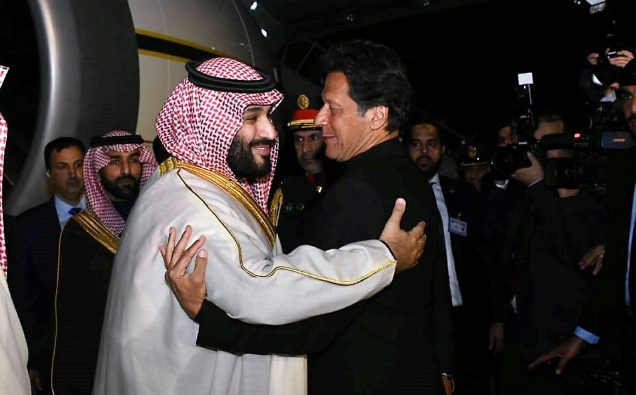
Pakistan and Saudi Arabia looked set to further cement their close ties as Crown Prince Mohammed bin Salman received a warm welcome upon arrival for a visit that promises to bring as much as $20 billion investment.
Prime Minister Imran Khan and Army Chief greeted the Crown Prince at the airport, signifying the importance Islamabad attaches to its longstanding ties with the Kingdom.
Khan himself drove the Crown Prince to the PM’s House, where the two countries inked $20 billion investment deals in a host of infrastructure projects.
Significantly, both Khan and the Saudi leader spoke of the future in hopeful terms.
Khan invited Riyadh to be part of an “exciting future” for Pakistan and the region in view of the ongoing nearly $50 billion China Pakistan Economic Corridor – which connects Beijing with the Gulf via Gwadar port.
The Crown Prince said, “Pakistan has a great future.”
Mohammed also said Saudi Arabia cares about its region and that Pakistan is the first country he has chosen to visit since becoming Crown Prince.
“Pakistan will be a very important country in the future, and we want to be part of (the future).”
He also listed economic, political and security cooperation as pillars of the bilateral relationship.
For Riyadh, Pakistan remains a lynchpin in its security paradigm. A former Pakistan army chief heads the Saudi-led counterterrorism coalition.
For Islamabad, Saudi Arabia is a source of economic and political support in both tough and good times.
The Middle Eastern landscape is beset with troubles and Saudi-Iranian rivalry has played out with deadly consequences in Syria and Yemen. Iraq is another battlefield of ideologies.
Meanwhile, Pakistan, the only nuclear-armed country in the Muslim world, has yet to overcome its lingering economic woes, and is also locked in a dangerous standoff with economically strong India over Kashmir.
The emergence of Imran Khan’s government from last summer’s elections and the Pakistani army leadership’s close working relationship with it has been a major factor nationally. Besides, Saudi Arabia, the country has received support and investment from the U.A.E. Qatar, Kuwait and other Arab allies as Islamabad tries to boost foreign exchange reserves and stimulate growth.
Both Saudi Arabia and Pakistan – though with several ups and downs – have had close ties with the United States. Currently, Washington is banking on Islamabad’s help for achieving a modicum of stability in Afghanistan through political reconciliation involving the Afghan Taliban.
The U.S. withdrawal of its troops from Syria and Afghanistan will means space for Russia and China to enter yet another great game of influence over the region from Afghanistan. India and Pakistan are already fighting for clout over Kabul.
Saudi Arabia and Pakistan are seen as among the most consequential players in the broader Middle East, and countries with great attraction for other powers as well including Islamabad’s neighbor China, which Khan noted was on way to becoming the country with the largest GDP.
As the regions including South Asia, Central Asia and the Gulf head to a future with several major powers jockeying for influence, economics and trade gaining overriding clout, and people having a heightened awareness through powerful social media platforms, further expansion in Saudi-Paki ties becomes critical.
The close relationship between Riyadh and Islamabad can work both ways for the region. The two countries can leverage their strong points to the betterment of the regions through economic cooperation and trade expansion in a way that transfers the benefits of growth to the people. Their respective ties with Iran will be important to the future direction of the region.
Yet, the future also demands that both Pakistan – a democracy – and Saudi Arabia – a Kingdom- provide countries also improve their human rights records to give hope to their people. The growing scrutiny of Pakistan’s human rights record and international criticism of the Saudi government over killing of journalist Jamal Khashoggi speak about the work the two countries must do for their people and their international standings.
Both need to curb the militant mindset by providing economic opportunities to the young people. The two countries are still grappling with implications of the support for militancy during the 1980s Afghan Jihad against Soviet occupation of Afghanistan.
An openness to new ideas in governance and business and respect for women and minorities together with human resource development of the young generation would multiply the potential of the two countries and help the well being of people in the Muslim majority countries.

















